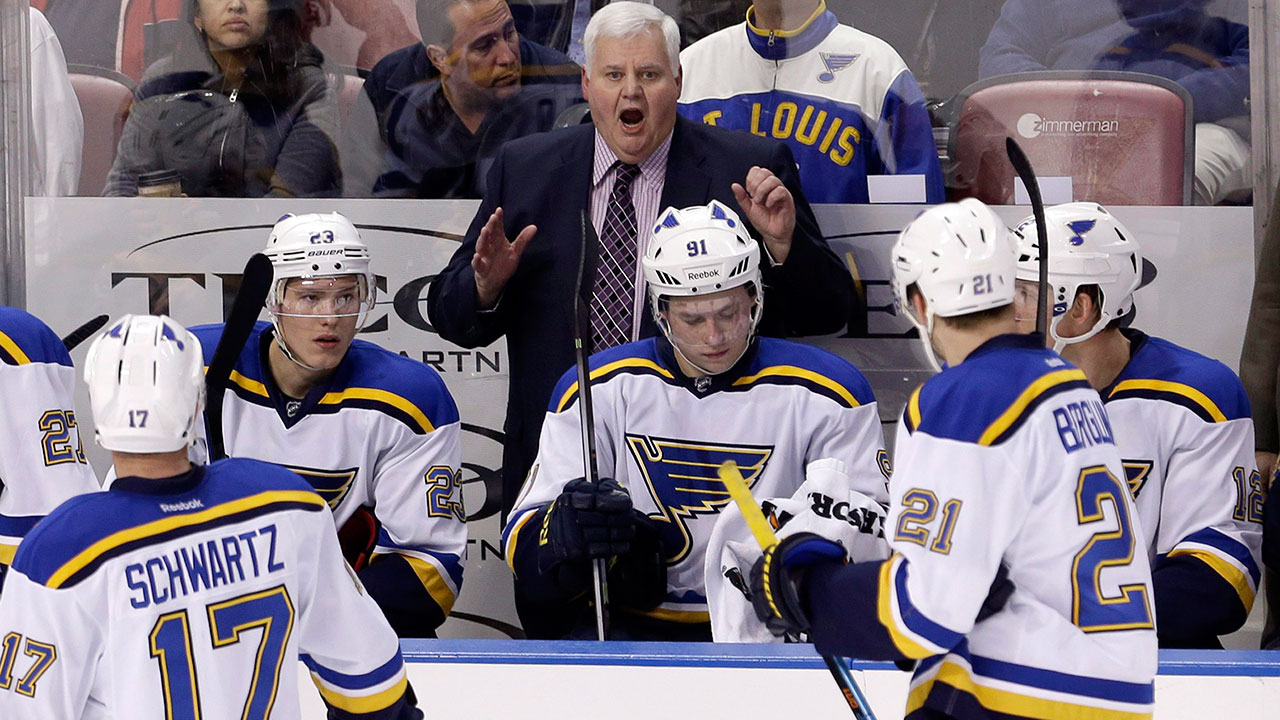EDMONTON — Ken Hitchcock was alone in life earlier than most. His father died when he was a teenager, and his Mom had to go to work. She would pass away not long after, with Hitchcock still in search of what would be his life’s calling.
It was his father’s death, however that began the transformation of a kid who was a decent centre in the Edmonton Minor Hockey system, into the junior coach in Kamloops who, at 476 pounds, struggled to tie his own skates.
He lost his life mojo for a time, which seems so strange when you talk to the confident leader/coach Hitchcock has evolved into at age 64.
Today Hitchcock has tackled those demons. He is, for this hockey reporter, the most educational quote in hockey, and self-confident enough to have worked on one-year contracts for several years now. Hitchcock doubled down on that this season, stating publicly that this would be his last year behind the Blues bench, leaving us to make the leap that retirement beckoned.

He’ll leave the Blues’ bench. But any thoughts that this season is a farewell tour for Hitchcock — who as a Midget coach sharpened skates in this town at a sporting goods store called United Cycle — evaporates quickly when you speak with him before a Blues practice.
“Until I literally can’t talk anymore, I want to be connected to a team. The best feeling in the world is being connected to a team,” Hitchcock said on Wednesday, leaning back on a wall outside the St. Louis dressing room. “I’ve been lucky enough to have that since the 70s, and I don’t ever want to lose that feeling.
“I want to have a stake in the game, in whatever venue that you choose.”
Listen a little longer however, and you realize he is saying “a team.” Not “an NHL team.”
Could it be like colleague Ralph Krueger, who took his talents to the Premiership as the Chairman of Southampton? Would Hitchcock settle into a mentoring role with Hockey Canada, working with coaches across the country?
Or what if the NHLers do not participate in the 2018 Olympics? Would Hitchcock be the perfect guy to a Spengler Cup lineup to PyeongChang and bring home a medal?
“It doesn’t have to be in the NHL. It doesn’t have to be a sports team. It could be a team of anything,” he said. “I just think it’s a really hollow feeling to not be part of anything. You’ve got no purpose. You’ve got no design, no plan. You’ve got nothing.
“It’s the scheming and planning that’s exciting for me. The debates. The arguments. The dialogue.
“We’ll see. It’s the last year of my deal, and let’s see what’s in store after that.”
When I was a kid in Edmonton, we would go every March to watch the Midget AAA playoffs, where Hitchcock’s Sherwood Park Chain club would play — and usually beat — teams from the South Side, Canadians or Maple Leafs Athletic Clubs. Then he graduated to the Kamloops Blazers, where they averaged well over 400 goals per season during his six seasons in The Loops.
Eventually he would bring his Dallas Stars through town to knock the Oilers out of the playoffs each spring, and it was with that club that Hitchcock won his only Stanley Cup in 1999.
He’s been a part of three gold medal-winning staffs for Team Canada at the Olympics, and after losing in the Western Conference Final last season he asked Blues GM Doug Armstrong if he could have one more kick at the can in St. Louis this season. Armstrong, in turn, hired Mike Yeo to be Hitchcock’s associate coach.
So now Hitchcock can go through the league and say his goodbyes, right?
“I haven’t done any of that stuff,” he said. “I don’t want to look in the rearview mirror or look ahead. That’s the worst thing you can do as a coach. Just day to day.”
There is no better quote in the game today than Hitchcock. So, what about a career behind the microphone?
“Not smart enough,” chimed in Blues radio analyst Kelly Chase. “Too much hair for TV,” added cue ball TV colourman Darren Pang.
“Zero interest,” Hitchcock said of the TV offer. “Radio? Zero interest.”
We hear players say it all the time: The moment they lose their zest to train in the summertime is the moment they know it’s time to walk away from the game.
In Hitchcock’s case, it’s a personal development thing. He spends a good part of his summers crafting his trade — even after this long in the coaching game.
Why?
“I needed an edge,” he explains. “I didn’t play at a high level, and if you want the respect of the players who’ve played and sacrificed in the league you better find enough knowledge so they respect that. I owed the team my edge and that was finding every ounce and bit of information I could get my hands on.
“I went to three clinics in three straight weekends this summer. Leadership symposiums, stuff that’s intriguing. You get tidbits and a lot of stuff I’ve used. Last year, I used some tidbits I’d learned at a symposium at Washington State. I was there for five days.
“But this summer, when I had to fill out commitments for next year, I didn’t want to do that. So I have to let the team know that. And I did. I’m not signed up.”
He’ll finish the NHL season and walk into the next phase of his life. That phase could be in business, in a different sport, or behind the bench of the Vancouver Canucks or Montreal Canadiens, for all we know.
It’s Ken Hitchcock. He’s got to be part of a team.
And isn’t there is always a team that wants a part of him?









